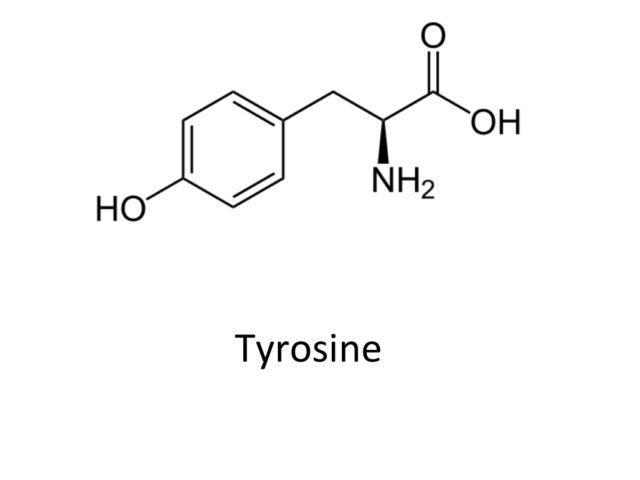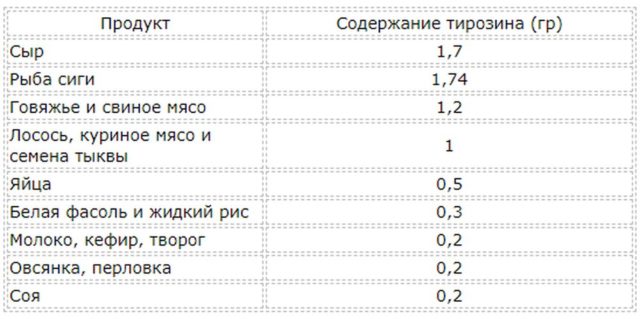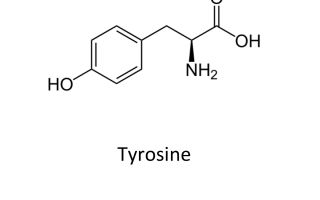Content
Adequate functioning of the body is ensured by the intake of beneficial nutrients, among which are called amino acids. These organic compounds can be ingested or synthesized in the body. The nonessential amino acids include tyrosine. The substance is found in every cellular element of the human body. Tyrosine-rich foods are important to include in your diet.
The effect of tyrosine on the body
The chemical name of the amino acid is 4-hydroxyphenylalanine. Tyrosine is one of the 20 essential substances that are represented by organic compounds. It is a replaceable unit. The body is able to synthesize tyrosine on its own. The use of a sufficient amount of amino acid sources makes it unnecessary to take additional dietary supplements.
Tyrosine influences many processes in the body. One of the functions of the substance is the production of neurotransmitters that are necessary for the proper functioning of the brain and maintaining a good emotional background.
The term is translated from Greek as "cheese". The substance got its name in the 50s of the 19th century. Tyrosine has been found in casein. This is the protein found in cheese.
There are 3 forms of organic compounds:
- L-tyrosine, which is present in proteins of living organisms;
- D-tyrosine, a neurotransmitter in enzymes;
- DL-tyrosine, which does not differ in optical energy.
The amino acid also has another meaning. It is involved in the synthesis of hormones and chemicals, in particular melanin. Thanks to the nonessential amino acid, the organs (thyroid, pituitary, adrenal glands) work, which are responsible for the production and regulation of hormone levels.

The following positive properties are called:
- improving mood, creating a sense of well-being;
- increased cognitive function during periods of stress;
- protection of the body from the consequences caused by anxiety and nervous shocks;
- participation in the production of the hormone of happiness and pleasure (dopamine).
Among the main functions of an organic compound are:
- Protein synthesis. The body uses various combinations of 20 amino acids to build the corresponding molecules. One of them is tyrosine. Proteins or proteins are able to control the activity of genes, provide chemical reactions, the structural support needed for cellular elements.
- Keeping the brain working. The function is carried out through the creation of neurotransmitters that transmit nerve impulses.
- Reducing stress. This is due to the production of norepinephrine and adrenaline. Tyrosine can also mitigate the effects of being in the cold, relieve fatigue after active work. The amino acid affects sleep, increases intellectual potential and performance.
- The implementation of physiological processes.The organic compound is directly involved in the synthesis of melanin. This pigment gives the skin its color while protecting it from the harmful effects of UV rays.
- Effects on hormones. The substance controls the functioning of the thyroid and pituitary glands. Suppressing appetite and reducing fat storage occurs by increasing levels of the hormones epinephrine and norepinephrine.
Signs of a lack and excess of tyrosine
Abuse of protein foods rarely causes an increased concentration of the substance in the body. Excess usually occurs with the use of appropriate dietary supplements, which manifests itself:
- joint pain;
- migraines;
- allergic reactions;
- disorders of the digestive system;
- insomnia.
Often, experts identify a deficiency of nonessential amino acids, which is caused by insufficient intake of foods containing L-tyrosine. Chronic lack of a substance provokes the development of hypothyroidism. Other symptoms include:
- weight gain;
- a decrease in the volume of muscle tissue;
- dementia;
- violation of the menstrual cycle;
- dry and brittle hair;
- lethargy;
- decrease in pressure.
When tyrosine is deficient, you need to consume more foods that contain it. This will eliminate pathological signs.
The effect of nutrition on the content of tyrosine in the body
It is known that the substance belongs to the nonessential amino acids. With its insufficient intake in the body, the deficiency is compensated by phenylalanine, which is synthesized.
Daily requirement
Experts do not recommend exceeding the dosage of the substance. To get the daily allowance, you need to include a variety of foods in the diet.
The maximum daily rate does not exceed 12 g. The average rate is 1-5 g of the substance. This amount is sufficient for adequate performance of functions in the human body.
An increase in the dosage of tyrosine is required in the following cases:
- excess weight;
- poor memory;
- dysfunction of the thyroid gland;
- hyperactivity;
- tendency to depression;
- Parkinson's disease;
- PMS symptoms;
- intense physical activity.
You should not abuse foods containing tyrosine if you have digestive disorders, Felling's disease, or if you are taking antidepressants.
Digestibility
The body metabolizes the amino acid in the form of adrenaline, norepinephrine and dopamine (catecholamines). These neurotransmitters correct the following processes:
- Attention;
- energy;
- memory;
- mood.
Insufficient intake of catecholamines in the body leads to cognitive dysfunction. To normalize their level, you need to eat foods that are distinguished by significant concentrations of the substance. These include turkey, fish, chicken. In some cases, it is advisable to take medications and dietary supplements.
Tyrosine is introduced into the nervous system (central) due to the rapid overcoming of the blood-brain barrier. This increases the level of dopamine, norepinephrine, adrenaline. Thus, an organic compound affects a whole range of processes in the body.
What foods contain tyrosine
The amino acid is present mainly in protein products:
- meat (chicken turkey);
- fish (cod, tuna, mackerel, halibut);
- dairy products (yogurt, cottage cheese);
- nuts (almonds, peanuts, pistachios);
- fruits (bananas, avocados);
- legumes (chickpeas, beans, lentils);
- seeds (sesame, sunflower);
- soy;
- seafood (shrimp, crabs).
The leader in the presence of organic compounds is cheese.
Tyrosine Rich Table
The essential amino acid is found in animal and plant foods. Tyrosine is found in the foods listed in the table:

Rules for taking products containing tyrosine
It should be borne in mind that in some cases, the intake of an amino acid into the body can cause unpleasant symptoms:
- anxiety;
- indigestion;
- migraine;
- tachycardia;
- nervousness.
You should not give preference to a specific group of products. Meals should be as varied as possible.
Overdose
A decrease in the amount of tyrosine entering with food and dietary supplements is necessary when the following signs appear:
- increased heart rate;
- increased excitability;
- loss of appetite;
- anxiety;
- pressure change;
- diarrhea;
- drowsiness;
- dizziness;
- allergic rash;
- disruption of the thyroid gland;
- nausea;
- insomnia.
Conclusion
Tyrosine-rich foods are essential for maintaining amino acid levels. With their insufficient use, the organic compound is synthesized thanks to phenylalanine. The substance affects the functioning of organs and systems, is responsible for the emotional background. The amino acid tyrosine is found in protein foods. Their inclusion in the diet ensures well-being and a subjective sense of well-being.

